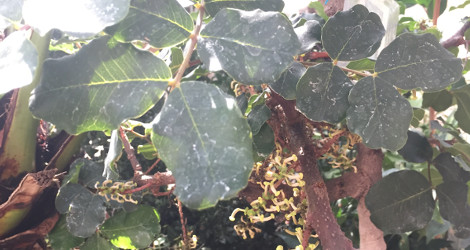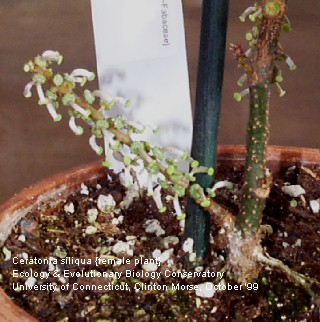Accession Data
Ceratonia siliqua
Common Name: Carob, St. John's Bread
Family: Fabaceae
Country of Origin: Mediterranean region
Description: Dioecious. This accession is female.
Legend says St. John ate the pods, thus the second common name.
Many plants have a rich history of use throughout time, but few can probably out boast the humble carob tree. It is said that the sweet pulpy fruit pods of the tree were the "locusts" that St. John survived on in the wilderness and thus the name associated with it.
In 1811 and 1812, these pods were the principle food of the British Cavalry during the war and they have been much used for cattle fodder. At one time, the seeds were in high demand by chemists, as singers thought that they cleared the throat. The seeds were even once used by jewelers as the original carat weight. Even medicinal uses have been found for the pods, with laxative and demulcent qualities being associated with them.
The pods are rich in protein and sugar and have often been proclaimed "wholesome for man or beast". The pulp is a valuable sweetener and chocolate substitute and the seeds have even been roasted as a coffee substitute. The seeds and pods can be fermented and distilled, with the drink retaining the appealing flavor of the pods. The seeds ground up produce a protein rich flour that contains no starch or sugar and is ideal for diabetics. A mature tree can produce over 400 pounds of pods and seeds annually.
The tree itself is a native of the East Mediterranean area. It grows to 30 ft. with attractive, shiny green leaves and dark red flowers. It grows very well in dry areas and produces a beautiful wood with a pinkish hue. Young plants are excellent tub specimens for the greenhouse and mature plants are hardy to about 18 degrees. Seeds are relatively easy to germinate. Simply nick the hard outer coating and soak in warm water until swollen. Plant 1" deep in loose, well drained soil and they will normally germinate in about 3-4 weeks.
Accession Data
Accession #: 199000057
Accession Date: 1990-12-31 00:00:00
Bloom Status: 🪴 Not Flowering
Location: 2103
Quantity: 1
Source: Ressel
Classification
Division: Magnoliophyta
Class: Magnoliopsida
Subclass: eurosid I
Order: Fabales
Family: Fabaceae
SubFamily: Caesalpinioideae
Tribe: Cassieae
SubTribe: Ceratoniinae
Flowering Data:
This accession has been observed in bloom on:| Year | Jan | Feb | Mar | Apr | May | Jun | Jul | Aug | Sep | Oct | Nov | Dec | ||||||||||||||||||||||||||||||||||||||||
|---|---|---|---|---|---|---|---|---|---|---|---|---|---|---|---|---|---|---|---|---|---|---|---|---|---|---|---|---|---|---|---|---|---|---|---|---|---|---|---|---|---|---|---|---|---|---|---|---|---|---|---|---|
| 2026 | ||||||||||||||||||||||||||||||||||||||||||||||||||||
| 2025 | ||||||||||||||||||||||||||||||||||||||||||||||||||||
| 2024 | ||||||||||||||||||||||||||||||||||||||||||||||||||||
| 2023 | ||||||||||||||||||||||||||||||||||||||||||||||||||||
| 2022 | ||||||||||||||||||||||||||||||||||||||||||||||||||||
| 2021 | ||||||||||||||||||||||||||||||||||||||||||||||||||||
| 2020 | ||||||||||||||||||||||||||||||||||||||||||||||||||||
| 2019 | ||||||||||||||||||||||||||||||||||||||||||||||||||||
| 2018 | ||||||||||||||||||||||||||||||||||||||||||||||||||||
| 2017 | ||||||||||||||||||||||||||||||||||||||||||||||||||||
| 2016 | ||||||||||||||||||||||||||||||||||||||||||||||||||||
| 2015 | ||||||||||||||||||||||||||||||||||||||||||||||||||||
| 2014 | ||||||||||||||||||||||||||||||||||||||||||||||||||||
| 2013 | ||||||||||||||||||||||||||||||||||||||||||||||||||||
| 2012 | ||||||||||||||||||||||||||||||||||||||||||||||||||||
| 2011 | ||||||||||||||||||||||||||||||||||||||||||||||||||||
| 2010 | ||||||||||||||||||||||||||||||||||||||||||||||||||||
| 2009 | ||||||||||||||||||||||||||||||||||||||||||||||||||||
| 2008 | ||||||||||||||||||||||||||||||||||||||||||||||||||||
| 2007 | ||||||||||||||||||||||||||||||||||||||||||||||||||||
| 2006 | ||||||||||||||||||||||||||||||||||||||||||||||||||||
| 2005 | ||||||||||||||||||||||||||||||||||||||||||||||||||||
References
- Plants For A Future Last accessed on Tuesday, October 31, 2017.
- California Rare Fruit Growers WWW Site
- SBE Seed January '97 email Newsletter
- The Plant List (2013). Version 1.1. Last accessed on Tuesday, October 31, 2017.
- Ceratonia siliqua at ARS-GRIN. Last accessed on Tuesday, October 31, 2017.
- Ceratonia siliqua at Wikipedia. Last accessed on Tuesday, October 31, 2017.
Images


